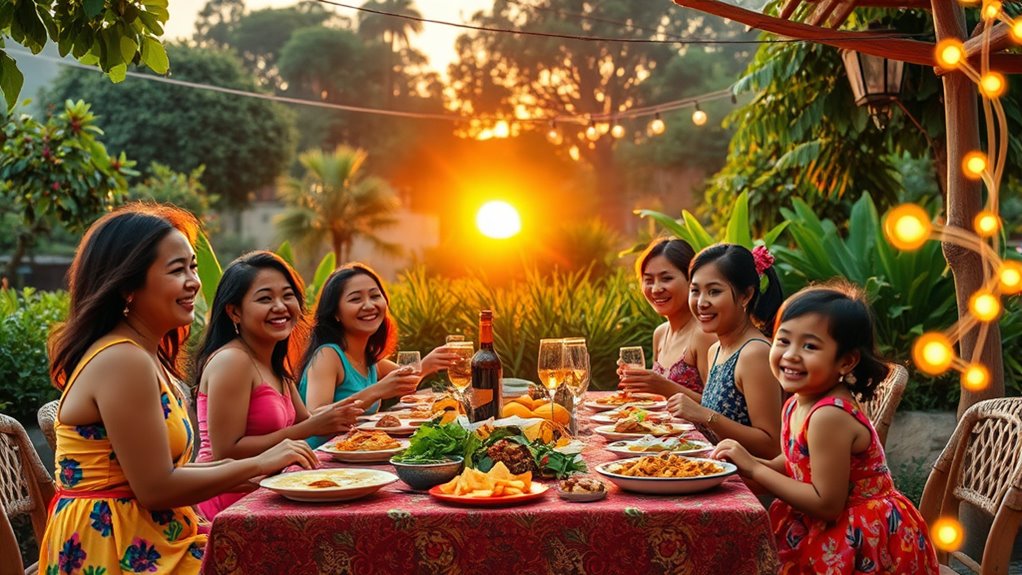Filipina wives cherish family gatherings because they strengthen bonds and celebrate their cultural heritage. These events allow you to share traditional food, fostering intimacy and connection. Storytelling during these occasions helps preserve values and wisdom passed down through generations. Family gatherings provide emotional support, enhance well-being, and create a strong sense of belonging. Through these cherished moments, you can experience the unique dynamics of Filipino family life and all that it entails.
Key Takeaways
- Filipina wives cherish family gatherings as they reinforce cultural heritage and shared traditions, fostering a strong sense of identity and belonging.
- These gatherings provide opportunities for emotional support and connection, enhancing overall well-being and resilience within the family unit.
- Sharing traditional foods during celebrations creates lasting memories and strengthens bonds among family members, promoting unity and togetherness.
- Storytelling during family events allows the transmission of wisdom and values from elders to younger generations, preserving cultural continuity.
- Family gatherings serve as a platform for mutual assistance and collaboration, reinforcing loyalty and support within extended family networks.
The Cultural Significance of Family in Filipino Life
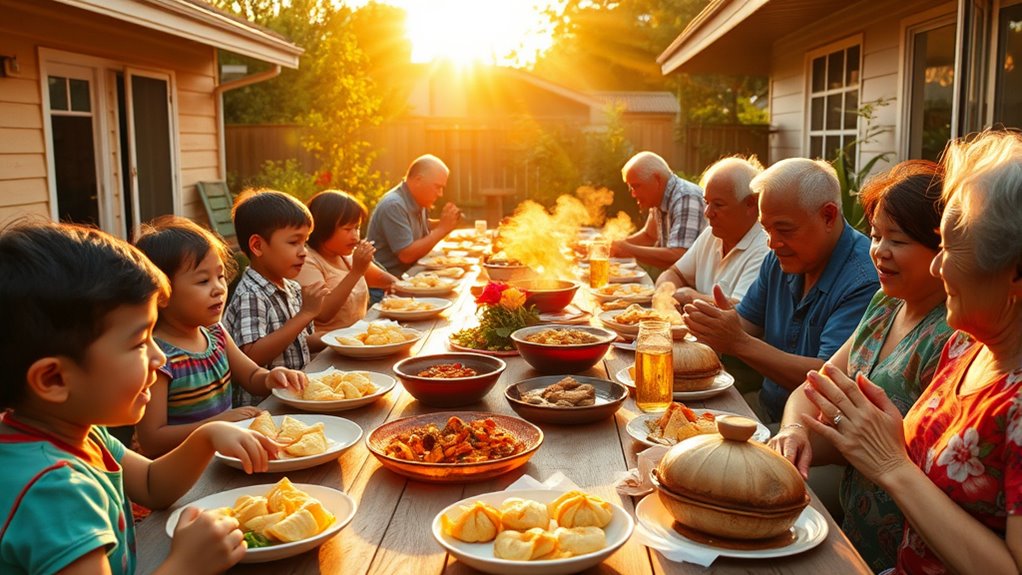
Family serves as the cornerstone of Filipino life, deeply woven into the fabric of culture and identity. In your everyday experiences, you’ll notice that family shapes your values and influences your identity.
Loyalty to kin is paramount; you’re expected to care for your elderly parents and honor your ancestors. The term “kapamilya” reflects the deep connections you forge, extending beyond mere blood relations.
As you participate in family gatherings, you reinforce cultural traditions, such as Noche Buena, and uphold respect for elders. These gatherings aren’t just celebrations; they’re crucial for maintaining social harmony and community cohesion.
Your ties to family dictate your social interactions, making familial bonds a fundamental part of your everyday life in the Philippines.
Strengthening Bonds Through Food and Celebrations
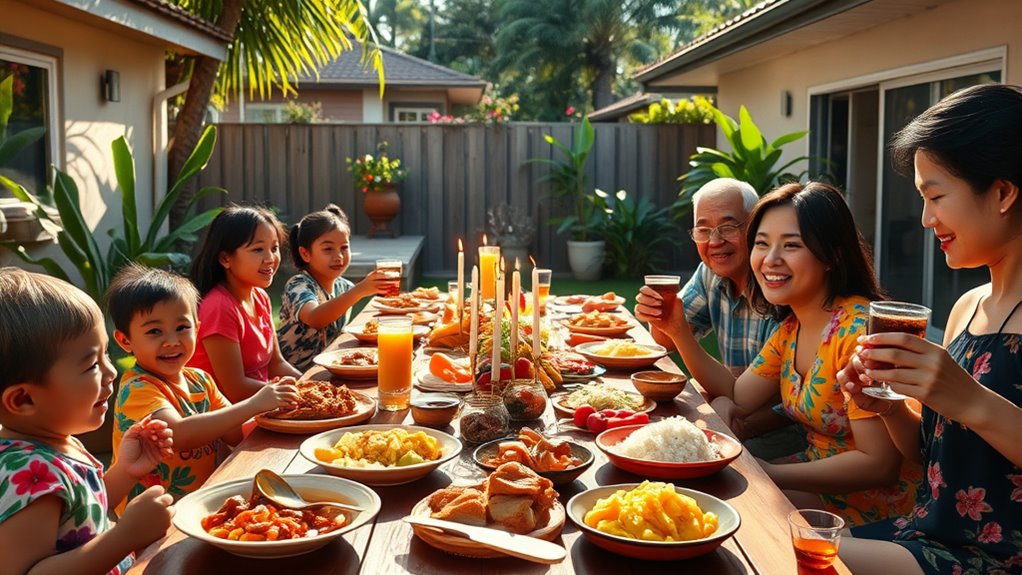
While enjoying a meal at a family gathering, you might feel the warmth of connection that food brings to Filipino culture. Traditional dishes play a significant role in strengthening family bonds.
Imagine sharing a succulent lechón or crispy lumpia with loved ones, each bite echoing laughter and stories. Special occasions like Noche Buena and Media Noche feature lavish feasts that emphasize unity and togetherness.
The act of eating together fosters community spirit, while shared plates encourage intimacy and connection. Generations gather around the table, preserving traditions and creating lasting memories.
Through these celebrations, you not only enjoy delicious food but also reinforce emotional ties, ensuring that the essence of family remains strong and cherished in your heart.
The Role of Storytelling in Family Gatherings
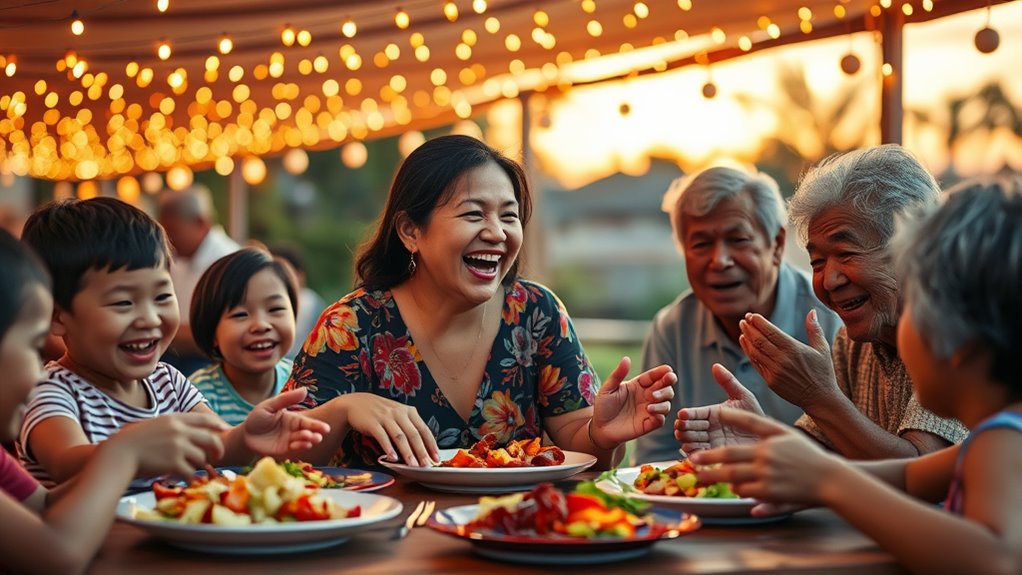
As you gather around the table, storytelling weaves a thread of connection that ties everyone together. It’s a powerful way to share experiences, struggles, and successes, creating a supportive environment for all.
You’ll find that stories help preserve cultural heritage, passing down traditions and values to the next generation. Engaging in storytelling fosters emotional connections, allowing you to understand each other on a deeper level.
Whether it’s a funny family anecdote or a lesson from the past, each tale builds trust and strengthens relationships. Elders often lead these sessions, sharing wisdom and bridging gaps between generations.
Through storytelling, you not only bond but also celebrate your rich Filipino identity, embracing diverse backgrounds within your family.
Embracing Traditions and Rituals
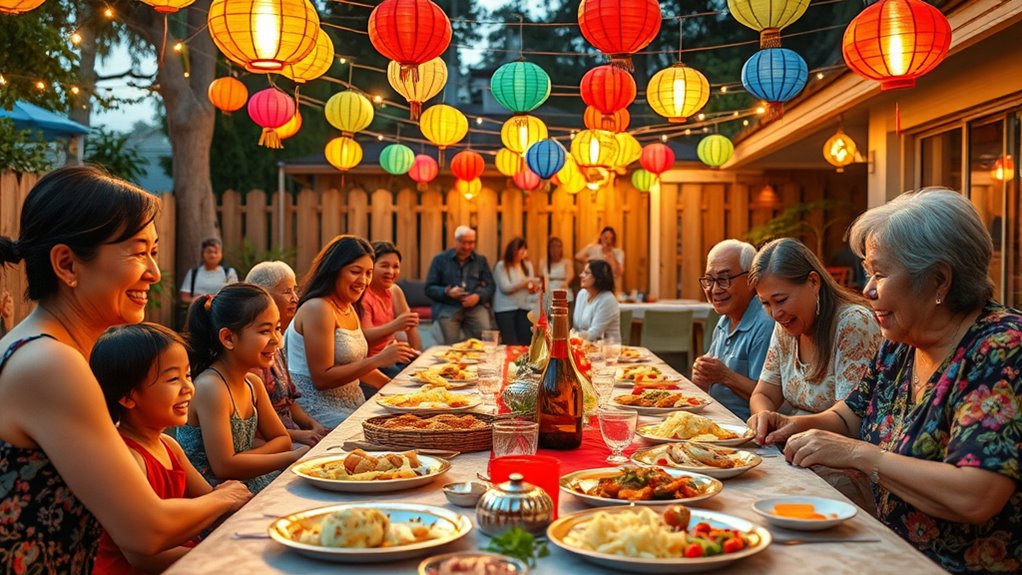
Embracing traditions and rituals creates a vibrant tapestry of cultural identity that strengthens familial bonds. You’ll find that participating in Simbang Gabi and Misa de Gallo during the Christmas season brings your family closer, reinforcing shared beliefs.
Setting up a Belén at home captures the essence of your faith, while special holiday masses like Noche Buena unite your loved ones around the dinner table. Engaging in practices like pagmamano shows respect for your elders, fostering deeper connections.
Sharing traditional foods such as adobo and halo-halo creates delicious memories and encourages storytelling. These cherished customs not only celebrate your Filipino heritage but also create a sense of belonging that nurtures emotional support within the family, making gatherings truly special.
The Importance of Family Values in Filipino Culture
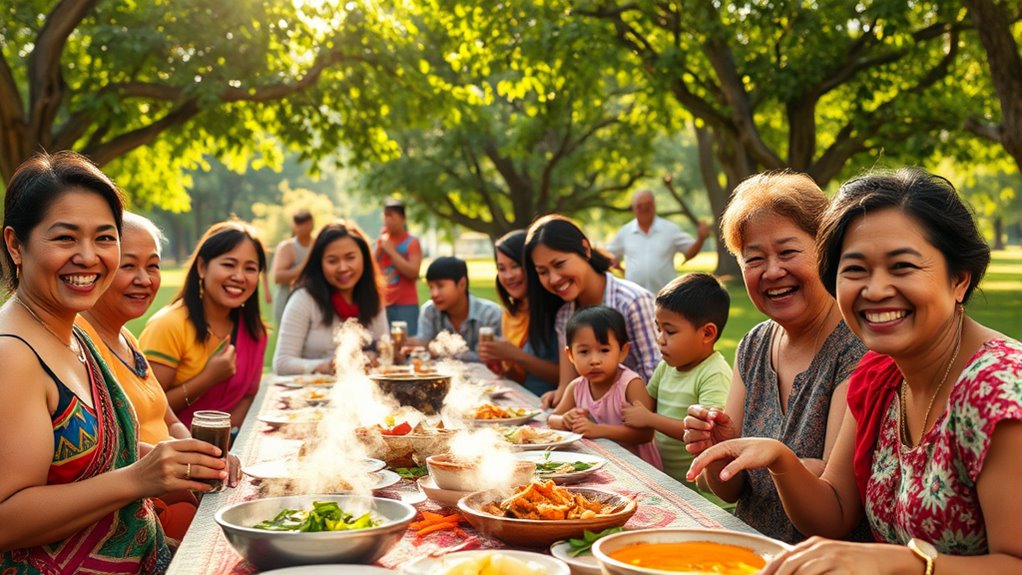
Family values form the backbone of Filipino culture, shaping identities and guiding behaviors. You’ll find that traditional values emphasize respect for elders and strong ties with extended family members, including grandparents, aunts, and uncles.
This interconnectedness fosters loyalty and obligation, creating a supportive network that extends beyond the nuclear family. Children learn to appreciate the wisdom of older generations, reinforcing a sense of duty and respect.
Interconnected family ties cultivate loyalty and respect, nurturing a supportive network that values the wisdom of elders.
Cultural identity is deeply tied to family, influencing individual morals and social norms. Hospitality and generosity towards family are common traits, while the bayanihan spirit reflects the importance of community support.
Ultimately, these values provide a foundation for resilience, guiding you through life’s challenges with a strong sense of belonging.
Community Support and Mutual Assistance
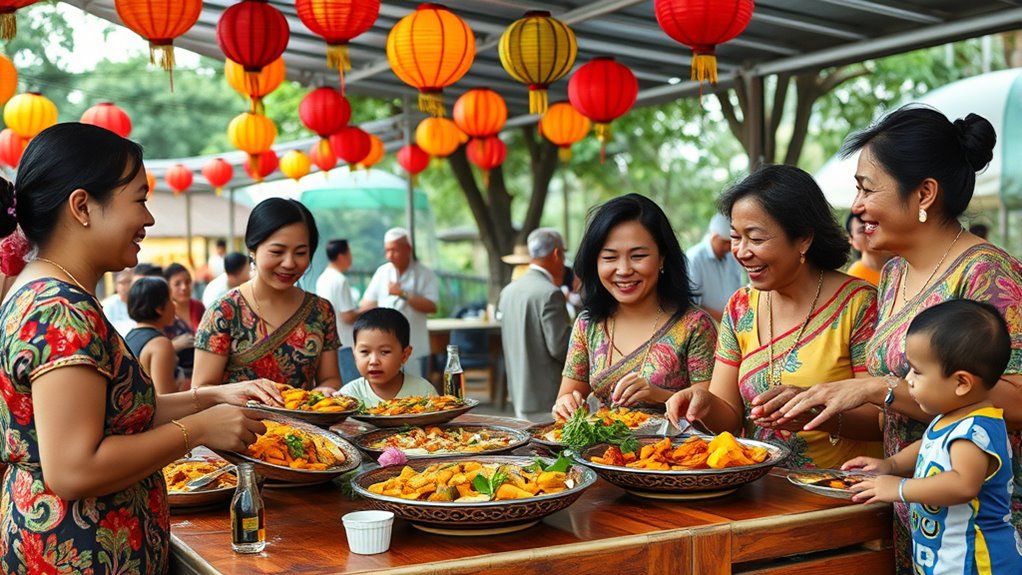
While maneuvering through life in a new environment, community support and mutual assistance become essential lifelines for Filipinos. You’ll find that community gatherings, like fiestas, create opportunities for socialization and bonding over food and music.
Shared living spaces often lead to new friendships and support networks, reinforcing the *kababayan* spirit that nurtures relationships among fellow Filipinos. Cultural events not only promote unity but also provide platforms for mutual assistance.
Community centers cater to your needs by offering resources like employment assistance and health programs. These spaces empower you through grassroots leadership and advocacy for caregiving journeys for workers’ rights.
Engaging in these networks enhances your resilience and sense of belonging, making life in a foreign land more manageable and fulfilling.
Respect and Inclusion in Family Dynamics
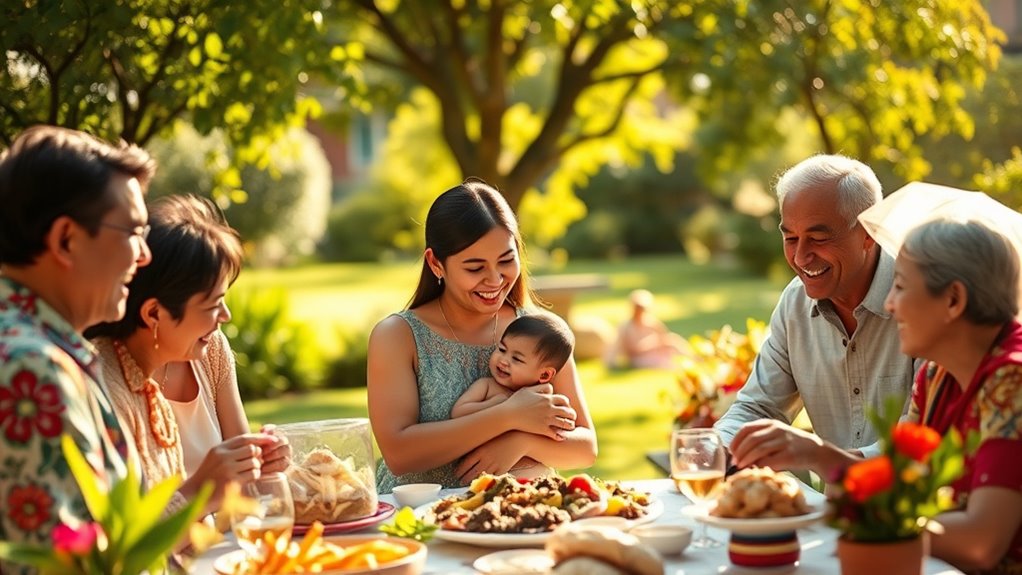
Respect and inclusion are cornerstones of Filipino family dynamics, shaping the way relationships thrive within the household. You’ll notice that respect is deeply ingrained in the culture, emphasizing obedience to elders while passing down traditional values that foster a sense of community. In gatherings, inclusion extends beyond immediate family to include extended relatives, reinforcing collective responsibility for each other’s well-being. This dynamic promotes shared traditions that strengthen bonds and cultural identity. Additionally, temporary alimony can sometimes impact financial stability and family dynamics, highlighting the importance of addressing individual needs during gatherings. Understanding the legal aspects of divorce processes can also provide insight into how family structures may shift during difficult times. Couples who work together report higher satisfaction in their relationships, which can enhance the overall family environment during gatherings. Furthermore, emotional regulation is crucial for maintaining harmony during these events, allowing family members to express their feelings in a constructive manner.
As families adapt to modern life, they find a balance between honoring traditional respect and embracing individual freedoms. By valuing each member’s voice and contributions, you create a harmonious environment where everyone feels acknowledged, making family gatherings not just a celebration but a reaffirmation of unity and love. Additionally, the emotional manipulation often seen in narcissistic relationships can disrupt these family dynamics if not addressed.
Intergenerational Ties and Their Impact

Intergenerational ties greatly shape the dynamics of Filipino families, especially during gatherings where these connections come alive. In multigenerational homes, grandparents and extended family contribute to shared responsibilities, fostering strong emotional bonds. These gatherings become crucial for reinforcing ties, as the bayanihan spirit encourages cooperation and collective support. When you celebrate traditions together, you not only create lasting memories but also strengthen cultural heritage.
Grandparents play an essential role in passing down wisdom and values, ensuring that younger generations feel a sense of belonging. Furthermore, these gatherings often serve as opportunities for families to share trustworthy insights that enhance their collective knowledge and understanding. Despite modernization and migration challenges, families adapt through technology, keeping connections alive. Additionally, the importance of emotional support cannot be overstated, as it enhances mental well-being and nurtures resilience within the family.
Ultimately, these intergenerational ties provide emotional support, enhancing mental well-being and nurturing resilience within the family.
Preserving Cultural Identity Through Family Gatherings
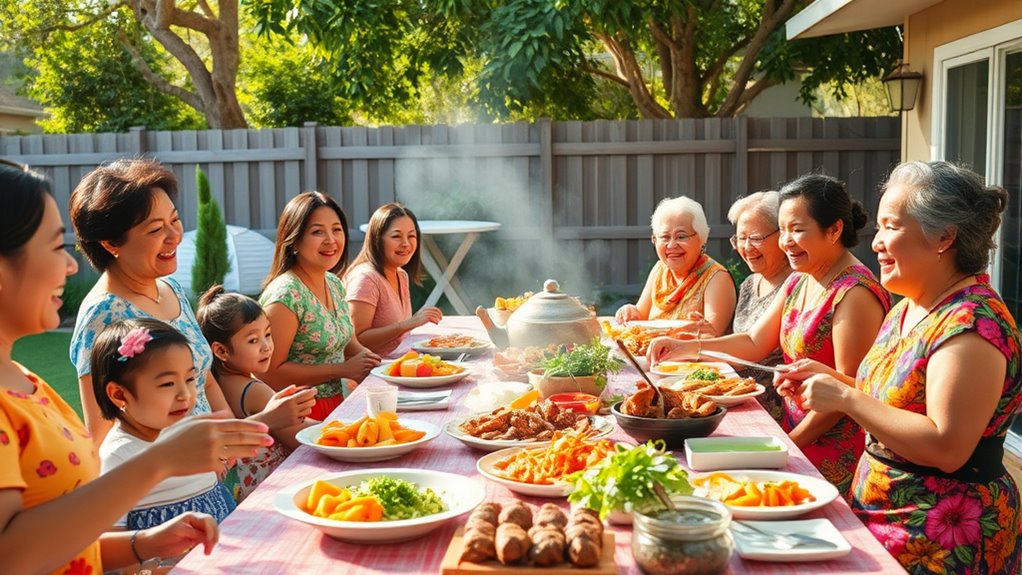
Family gatherings play an essential role in preserving cultural identity, as they bring people together to celebrate traditions and share experiences.
During fiestas, you’ll savor traditional foods and music that highlight your region’s unique specialties. Sharing these dishes fosters a sense of community and strengthens bonds among family members. Additionally, the joy of gathering can enhance emotional well-being, much like how pet therapy benefits individuals with dementia and Parkinson’s.
The storytelling tradition, or “kwentuhan,” allows you to reconnect and pass down experiences, ensuring cultural continuity. Embracing the bayanihan spirit, everyone contributes to the event, promoting unity and cooperation.
Even in modern times, these gatherings adapt to challenges, keeping cultural values alive and relevant. By participating in family gatherings, you actively contribute to preserving your heritage and building stronger community ties. Additionally, these events often feature halal culinary traditions, which reflect the diverse and rich aspects of halal living.
Frequently Asked Questions
How Do Filipina Wives Organize Family Gatherings?
When you organize family gatherings, you start by communicating with relatives to set a date and details.
You choose a venue that can accommodate everyone, often at home.
Planning the menu is essential, with traditional dishes like adobo and lechon.
You manage the guest list, coordinate activities, and arrange transportation for those traveling from afar.
Finally, you guarantee decorations reflect the occasion, creating a warm and inviting atmosphere for all.
What Are Common Dishes Served During Family Gatherings?
During family gatherings, you’ll often find a delightful spread of common dishes that reflect Filipino culture.
Adobo, marinated meat simmered in a savory sauce, is always a favorite. Pancit, with its rich flavors, and lechon, the star of celebrations, also take center stage.
Don’t forget the kakanin, sweet rice cakes that satisfy your cravings, and ube halaya for dessert. Together, these dishes create a feast that brings everyone closer as you share delicious memories.
How Often Do Families Hold Gatherings in the Philippines?
In the Philippines, families hold gatherings quite frequently, often celebrating traditional events about 20 to 30 times a year.
You’ll find that these occasions vary from birthdays to holidays, and even simple reunions. They’re a great way to strengthen family ties and create lasting memories.
Whether you’re in a rural or urban area, the spirit of togetherness and community shines through, making these gatherings an essential part of your cultural experience.
What Role Do Children Play in Family Gatherings?
In family gatherings, children play a crucial role. You’ll notice them participating in traditional dances, sharing stories, and engaging with their elders.
This involvement not only helps them bond with family but also teaches them cultural values and traditions. Through these interactions, they develop essential social skills and emotional intelligence.
As they learn from their elders, they prepare for future responsibilities, ensuring the family’s cultural legacy continues.
How Can Non-Filipinos Participate in These Gatherings?
To participate in Filipino gatherings, you should embrace the culture wholeheartedly.
Start by greeting everyone warmly and showing respect to elders. Bring a traditional dish, like lumpia or pancit, to share.
Join in on games and activities, as they foster connection. Learning a few basic Filipino phrases can enhance your interactions.
Don’t hesitate to ask questions about customs; your curiosity will be appreciated and can lead to meaningful conversations.
Enjoy the experience!
Conclusion
In the heart of every Filipina wife lies a tapestry woven with vibrant family gatherings, each thread representing love, tradition, and unity. Just like a pot of simmering sinigang, these moments blend diverse flavors—stories, laughter, and shared meals—into something nourishing. When you gather around the table, you’re not just sharing food; you’re passing down values and creating memories that last a lifetime. Embracing these gatherings keeps the Filipino spirit alive, reminding us that family is the ultimate treasure.
